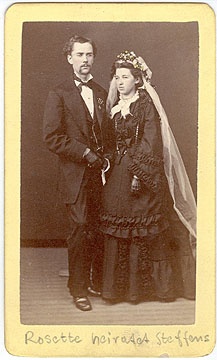MATHEW
J. STEFFENS -
REVISED
EARLY CHRONOLOGY
by
Thomas G. Yanul, copyright
Page
11
Because
new material has come to light regarding the photographers early years in
Chicago,
it seems easier to add this page rather than re-write the first Steffens
page.
Since
there is/was very little information available concerning Steffens' early
years, what was published in the Photo Beacon Photography Magazine in
1894, was at the time, the only information of record. This article had him
returning to Chicago from Detroit within days of the great Chicago fire of
1871 and setting up business as a photographer on or near 22nd St.
Additional found materials indicate this was not exactly the case. There
still was a gap in time from 1871 to 1886 or so. The ability to say exactly
where Steffens was at this time is compounded by various names and address
found in Chicago city directories. The reference to "Joseph Steffens" in
early years would seem to indicate M.J. was using his middle name because
later, at the same address, the use of M. J. Steffens is used. And I suppose
its possible there were two M.J. Steffens photographers in the city at that
time, but its unlikely.
The
first record of place & time - 1873 - puts "Joseph Steffens" at 94 Archer
Av. This changes to 102 Archer av in 1874-77, but back to 92 in 1879, and
then to 2135 Archer av in 1880. I would suspect these are all the same
location, taking simple errors and city numbering changes into account.
The business card shown above came from a kind of rememberance book
titled "Autographs" filled with personal messages to a young woman named
"Lydia A. Gaus, Chicago, Feb.8th, 1880" In it, Steffens wrote three pages
of aphorisms to live by, one page in English, and another that was
written
in
English, Spanish, Italian, Portuguese, and French and German ! They are dated
May
and
June, 1880. What Steffens connection with this woman is unknown. The
book was
found
in Oregon.
In
1882 the appearance of a partnership is recorded, as "Steffens &
Schneider".
This
appears to last only one to three years, with Peter Schneider being listed
alone
at
the 2135 Archer av address 1885 to 1893. But a cdv with the rear advertising
logo
of
"Steffens & Schneider" was hand dated 1881. So the partnership may have
been
at
least two or more years. Another cdv dated 1878 bears the logo of
"Steffens
&
Co.", which would indicate he is not operating alone, but probably with
Schneider
as
an employee rather than a partner.
In
1882 M.J. Steffens appears for the first time at 2246 Cottage Grove Av. He
is at this
address
through the 1884-86 directories. And in 1886 it has already been determined
that
Steffens buys the former church building at 57, 22nd St., a building he remodels
twice
in subsequent years. The Cottage Grove address is actually just around
the
corner
from his 22nd street address, about one block distance as the crow
flies.
There
remains the task of figuring out exactly where the old Archer av address
is as
regards
current geography...much has changed since the 1880's. Also, what the
social make-up was around the Archer avenue address at the
time. His brief partnership with
Peter
Schneider is an unkown as regards who Schneider was, or why their partnership
came
about. Schneider was a German immigrant, his wife Swiss, so
the
connection may have begun along those lines first. It would seem reasonable
that
Steffens
was not operating officially - in the city directory - for at least one or
two
years
following his arrival in Chicago in 1871. That is if he did return
and actually
stay
in Chicago rather than go back to Detroit for any period of time. He was
afterall
a
rather young man, being 17 in 1871, the same year he married Rossete
Fisher.
Obviously,
unless some miraculous diary appears fleshing out the particulars of
Mathew Steffens' life, we have what we have. Which is a fairly
good outline of where he
was
and where he operated. It would of course be nice to have more biographical
personal
material, but as of now this is what we know.
The
next addition of substance regarding Steffens will be his attempts to revive
daguereotypy
in the late 19th C. Bits and pieces are at hand but much more
needs
to
be gleaned. It is an interesting story.
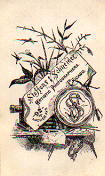
BUSINESS
CARD
Steffens
& Schneider-1880
For
higher quality image
click
on photo
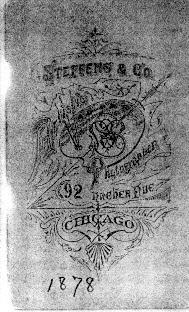
Steffens
& Co. 1878
92
Archer Av.
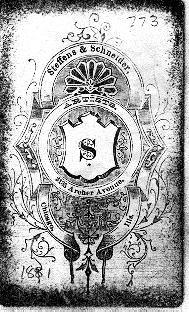
Steffens
& Schneider
1881
2135
Archer Av.
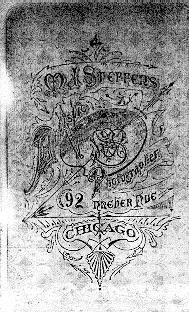
MATHEW
STEFFENS & ROSETTE FISCHER
CHICAGO, 1871
PHOTO COURTESY KIRK -FISCHER FAMILY, SWITZERLAND
CHICAGO, 1871
PHOTO COURTESY KIRK -FISCHER FAMILY, SWITZERLAND
press
on photo for larger image
MOUNTED
ON AN EARLY STEFFENS CARD
WHICH
IS STRONGEST PROOF HE WAS A WORKING PHOTOGRAPHER IN 1871
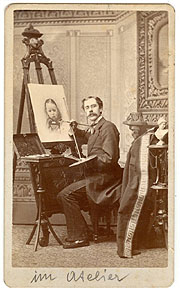
R-EARLIEST
KNOWN PHOTO OF M.J,. STEFFENS, ARCHER AV STUDIO, 1874-77
PHOTO
COURTESY KIRK-FISCHER FAMILY, SWITZERLAND ELISABETH KIRK DIRECT
DESCENDANT
OF
FRIEDRICH FISCHER, ROSETTE'S BROTHER,
M
J Steffens
92
Archer Av.
ABOVE-back
of 3 CDV's from
Darrah
Collection-Courtesy
Univ.
Penn Spec. Coll's.
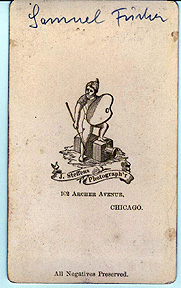
CABINET CARD, MID-1870'S.
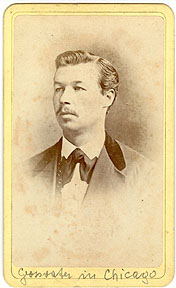
ONE WAS ROSETTE WHO MARRIED M.J. STEFFENS 1871.
WHILE
IN CHICAGO, FRIEDRICH PERFORMED WITH THE SWISS MALE CHOIR.
HE
RETURNED TO SWITZERLAND 1871 WITH MELTED NAILS FROM THE CHICAGO FIRE
AS SOUVENIRS.
PHOTO
BY JOSHUA SMITH 546 CANAL ST., CHICAGO OPERATED
1866-1886
